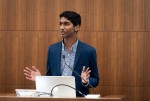Students voiced concerns about funding and inclusivity to the University of California Regents at a meet-and-greet followed by a town hall discussion on UC budgeting.
The Undergraduate Students Association Council external vice president’s office held the two events Tuesday at the UCLA Meyer and Renee Luskin Conference Center. At the town hall, panelists from UCLA and the UC Office of the President addressed the future of UC campuses amid enrollment growth challenges and declining funding for state facilities.
Students were encouraged to create an open dialogue with the regents during the informal meet-and-greet and ask questions about funding at the town hall. The events were open to all students.
George Kieffer, chair of the Board of Regents, said students asked him about nonresident tuition increases, budgeting and the structure of the UC system.
Regent Richard Sherman said the meet-and-greet gave the regents the opportunity to learn about student interests.
“We’re the advocates for the system but we can’t do it alone,” Sherman said. “We’re trying to tell the story of the UC to the public.”
Rhea Shetty, a second-year biology student, said she hoped to set up a meeting with the regents to discuss patent rights for Xtandi, a prostate cancer medication developed by UCLA researchers.
UCLA licensed the drug’s patent to a pharmaceutical company in 2005, according to a university press release.
Shetty said a generics manufacturer in India developed an affordable version of the drug but is unable to distribute it due to a patent appeal made by UCLA and the UC Regents, making the drug inaccessible to low-income patients.
Shetty said she hoped the meet-and-greet would bring the issue to the attention of the regents, after ineffective communication between UC President Janet Napolitan and the student-led organization Universities Allied for Essential Medicines.
Nicholas Gist, a fourth-year political science student and California Public Interest Research Group member, said he hoped to represent the interests of all students and see how CALPIRG could work with the regents to make policy changes.
Students later participated at a town hall discussion with panelists to discuss deferred maintenance funding and changes within the budget to accommodate systemwide enrollment increases. Among the panelists were UCLA Administrative Vice Chancellor Michael Beck and UC Chief Financial Officer Nathan Brostrom.
Brostrom said UC funding per student has decreased by 31 percent due to the enrollment of 100,000 additional students across the UC and increased labor costs. He said the UC is trying to make up for the shortfall through other parts of its budget.
Beck said UCLA’s maintenance projects would need $770 million in deferred maintenance funding.
“If you continue to defer maintenance, then a small cost today in preventative maintenance becomes a much larger cost under replacement in the future,” Beck said.
Students also asked how state-mandated enrollment could impact campus growth.
Beck said UCLA can continue to grow at half a percent per year by accommodating larger first-year classes and reducing the time it takes for students to earn a degree. He added that UCLA has been looking for new sources of funding, citing the 2028 Summer Olympic as an opportunity to gain $20 million for Sunset Recreation Center maintenance.
Brostrom said future construction projects will focus on fostering a community among students.
Aidan Arasasingham, a member of the USAC EVP office and second-year global studies student, planned both events hoping to initiate dialogue between students and UC Regents.
“For students, the regent space can be incredibly inaccessible – often times it’s up in UC San Francisco – and even when you’re in regent meetings, it’s difficult to engage person to person,” Arasasingham said. “This was a great opportunity to have regents and students come together to have human interaction.”
